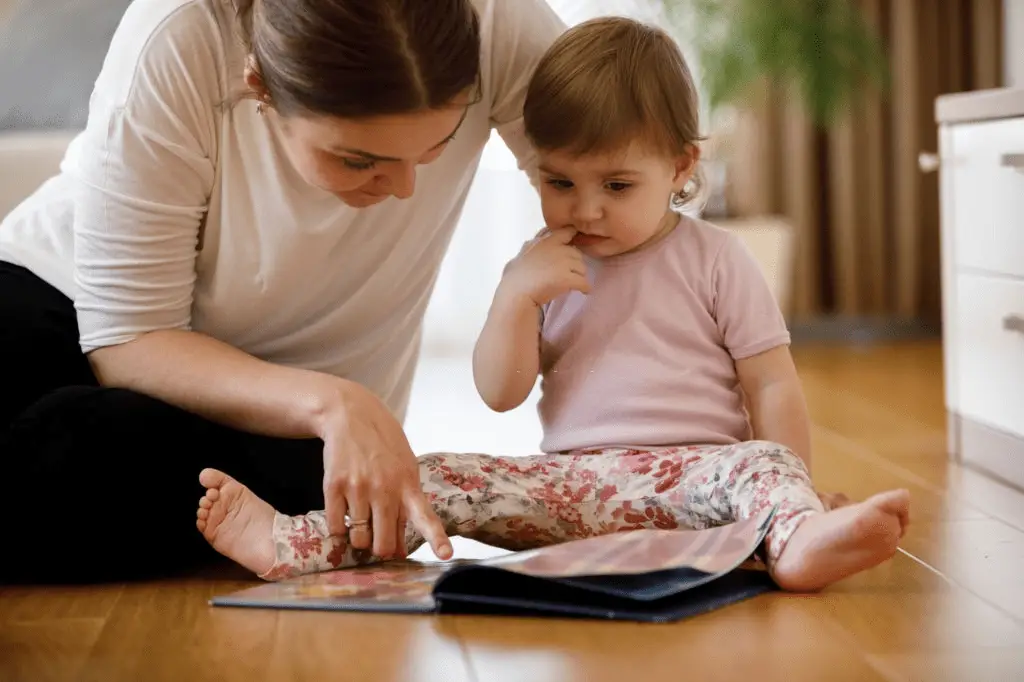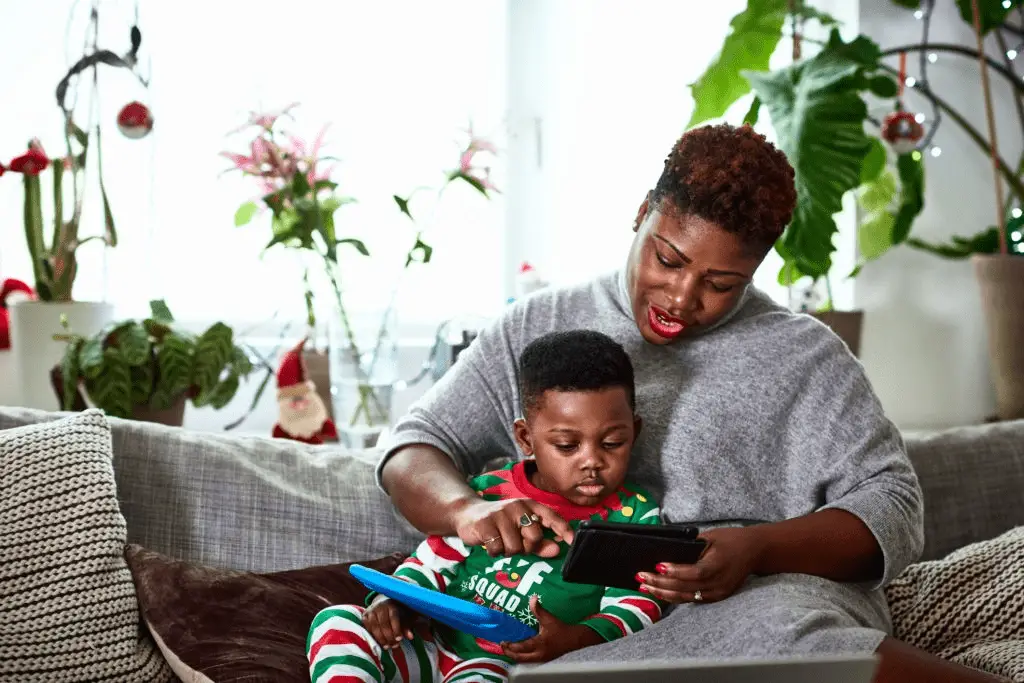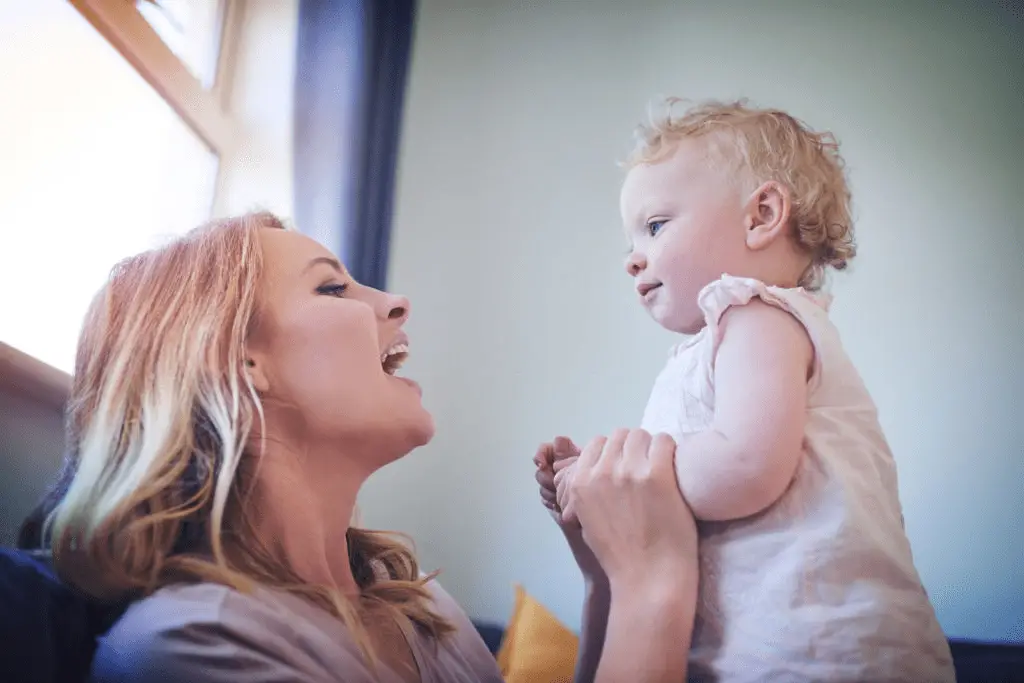Looking for ways to help your toddler speak more often, or would you like to help expand your child’s vocabulary? Scroll down for seven techniques to help your toddler talk.
Read with your Toddler
Books help expose your toddler to words he/she may not otherwise hear in a normal day, and books also have pictures. By reading to your toddler daily you are helping him/her make connections between words and their meanings.
While reading, ask your toddler to point to specific objects pictured. Later, ask your toddler to name pictures you point at. Don’t make it stressful. If your toddler will not name the object, name it for him/her.
Ex: “Oh, what is this? Do you know what this is a picture of?(Wait for reply, if none…) It’s a train! This is a picture of a train. Choo-choo!”
If your toddler doesn’t speak much, when reading a counting book you can label the pictures instead of counting. Ex: If it shows 3 ducks for the number three, instead of counting “one, two, three” say “Duck, duck, duck”.
It’s also helpful to gently take your toddlers finger and let him/her point to pictures as you say the words.
Narrate your Toddler’s Life
Help your toddler speak by labeling the objects and events in his/her life. Help them learn the words that describe their world by talking to your toddler about everything. Of course, it helps to take your toddler’s cue and talk about what he/she is looking at and interested in during that moment!

Things to Talk to your Toddler About:
Getting Ready for the Day: Narrate your morning routine. Ex: Talk about getting dressed. Talk about what’s for breakfast. Talk about spoons, bowls, cups. Talk about brushing teeth, talk about getting hair done. Talk about shoes. Talk about the color of shoes.
Things you are buying at the store: Point out some of his/her favorite things that you are buying at the store. Ask your child if he/she can say the word. Ex: “Look! It’s an apple! You love apples! Can you say apple?”
Toys your Toddler Loves: Play with your toddler. Be involved in the game. Tell your child the name of the toy he/she is playing with. If the toy would make a sound in real life, have the toy make the sound while playing. Continue to label the names of the toys in a way that fits in with the game. Ex: Baby doll may go waaa, car goes vroom, toy cow goes mooo, etc.
Talk about Actions: Teach your child action words too. Run with your toddler, jump with your toddler, clap with your toddler, roll a ball to your toddler. Name these actions as you do them.
Talk about Food: Tell your toddler the names of the food on his/her plate at every meal. Point to each food. Besides just labeling it, talk about it as you eat together. Ex: “Mmmmm…. I like my banana! Do you like your banana?”
Point out Objects while Riding in the Car: When you are stopped while driving in the car, point out objects your toddler can see from his/her window. Talk about trees, flags, motorcycles, stores, dogs, etc.
Talk about Bedtime: Talk about taking a bath, talk about choosing a book, talk about the moon and stars. Talk about whatever is part of your bedtime routine.
Teach your Toddler Some Sign Language
Many parents do not want to teach signs to a toddler. Some parents worry the toddler will choose to sign instead of learning to speak.
This is often not the case. Signing can help your child communicate with you.
It also stimulates your child’s brain, often helping a toddler speak. Usually when a child can say a word well, he/she will naturally give up signing it. So if your toddler is having a hard time learning to speak, signing may be a good way to open the door to language for him or her.
When signing to your child, always say the word you are signing as well.

Encourage Sounds
If your toddler does not speak much, encourage the sounds that he/she makes.
Before toddlers say words, they usually make sounds. Encourage all sorts of sounds: animal sounds, car sounds, train sounds, “wheeee” while going down a slide, “uh-oh” if there is a mistake, etc.
Exaggerate your Words
Many parents naturally exaggerate words when speaking with an infant or toddler. When you are trying to teach your toddler a word, really emphasize it. This helps your toddler hear all the sounds in that word.
Lengthen out your vowels and talking in that sing-song voice you would use when talking to a baby can actually help your toddler to speak.
Ex:Banana= Baanaaanaa Doggy=Doooggyyy
Ask Questions
Give your toddler chances speak to you. Offer your toddler two options and ask which one he/she prefers, then wait for an answer.
You could do this with toys, food, drinks, or even make this a silly game by offering one outrageous choice. Ex: “Do you want the ball or the car?” “Do you want the banana or apple?” “Do you want to drink milk or a shoe?”
You can also help your toddler talk by letting your toddler fill in the blank. If your child is very familiar with a line in a book, read it and pause before you say the last word of that line. See if your child will fill in the blank. Ex: The cat in the _ (hat).
You can also leave out a word in a favorite song: The Itsy Bitsy __ (Spider). See if your toddler will say the word that comes next if you don’t.
Ask questions you know your toddler knows the answer to. Ex: If you’ve told your toddler you are going to the park, ask “Where are we going?” See if your toddler will tell you.
Help your toddler speak by asking him/her to name body parts, too. Ex: Point to nose. “What is this?”
You can also turn your child’s grunts or pointing into a question helping your toddler speak. When he/she grunts or points at an object, ask if that is what he/she wants. Ex: “Do you want a drink?”

Use Music
Many toddlers love music. Use this to your advantage by singing songs your toddler loves, especially active songs with hand movements like “Itsy Bitsy Spider”, “The Wheels on the Bus”, “I’m a Little Teapot” or other favorite toddler songs.
Incorporate this into your toddler’s routine and you may eventually hear your little one singing along.
Conclusion – What to do if you are worried your toddler is behind
If developmentally you worry your toddler is not on track with his/her language and communications skills your child may need additional help. Every state in the U.S. has an early intervention program. Ask your doctor, or go online and find information about your state’s Intervention Program. Most of the time, evaluating your toddler is low cost or free.

